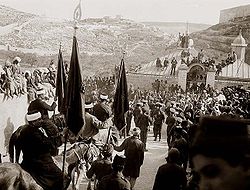
Back انتفاضة موسم النبي موسى Arabic Pogromo de Jerusalén en 1920 AST Pogrom de Jerusalem de 1920 Catalan Nabi-Musa-Unruhen German Disturbios de Nabi Musa Spanish قیام ۱۹۲۰ جشنواره حضرت موسی Persian Émeutes de Jérusalem de 1920 French מאורעות תר"פ HE 1920-as jeruzsálemi zavargások Hungarian Kerusuhan Nebi Musa 1920 ID
| 1920 Jerusalem riots | |
|---|---|
| Part of the intercommunal conflict in Mandatory Palestine and the Franco-Syrian war | |
 Nebi Musa procession, 4 April 1920 | |
| Location | Jerusalem, Palestine |
| Coordinates | 31°47′0″N 35°13′0″E / 31.78333°N 35.21667°E |
| Date | 4–7 April 1920 |
Attack type | Riot |
| Deaths | 5 Jews, 4 Arabs |
| Injured | 216 Jews, 18 Arabs, 7 Britons |
The 1920 Nebi Musa riots or 1920 Jerusalem riots took place in British-controlled part of Occupied Enemy Territory Administration between Sunday, 4 April, and Wednesday, 7 April 1920 in and around the Old City of Jerusalem. Five Jews were killed and several hundred injured; four Arabs were killed, and eighteen injured; 7 Britons were injured.[1] The riots coincided with and are named after the Nebi Musa festival, which was held every year on Easter Sunday, and followed rising tensions in Arab-Jewish relations. The events came shortly after the Battle of Tel Hai and the increasing pressure on Arab nationalists in Syria in the course of the Franco-Syrian War.
Speeches were given by Arab religious leaders during the festival (in which large numbers of Muslims traditionally gathered for a religious procession), which included slogans referencing Zionist immigration and previous confrontations around outlying Jewish villages in the Galilee. The trigger which turned the procession into a riot is not known with certainty.[2]
The British military administration of Palestine was criticized for withdrawing troops from inside Jerusalem and because it was slow to regain control.[3] As a result of the riots, trust among the British, Jews, and Arabs eroded. One consequence was that the region's Jewish community increased moves towards an autonomous infrastructure and security apparatus parallel to that of the British administration.[citation needed]
In its wake, sheikhs of 82 villages around the city and Jaffa, claiming to represent 70% of the population, issued a document protesting the demonstrations against the Jews. This condemnation may have been procured with bribes.[4] Notwithstanding the riots, the Jewish community held elections for the Assembly of Representatives on 19 April 1920 among Jews everywhere in Palestine except Jerusalem, where they were delayed to 3 May.[5] The riots also preceded the San Remo conference which was held from 19 to 26 April 1920 at which the fate of the Middle East was to be decided.
- ^ Cite error: The named reference
segevwas invoked but never defined (see the help page). - ^ Freitag, Ulrike; Fuccaro, Nelida; Ghrawi, Claudia; Lafi, Nora (30 March 2015). Urban Violence in the Middle East: Changing Cityscapes in the Transition from Empire to Nation State. Berghahn Books. p. 188. ISBN 978-1-78238-584-4.
While the first half of the procession was passing through the Jaffa Gate, the riot began between Christaki's pharmacy and the Credit Lyonnais. Available sources do not clarify the exact trigger, and it is arguable that more than one event functioned as a catalyst. In the vicinity of the Arab rally, some Zionists were listening to the speeches. It is likely some belonged to the self-defence force organized by Vladimir Jabotinsky, by this time already enlisting six hundred troops performing military drills on a daily basis." Already in early March, Jabotinsky was working to inflame the atmosphere, and he began to publicly predict a pogrom. Some evidence suggests that these Jewish spectators were quite provocative. Allegedly, a Jew pushed an Arab carrying a nationalist flag, and he tried to spit on the banner and on the Arab crowd. According to testimony gathered by the French consul, some young Jews standing near Jaffa Gate attacked some Arabs after the speech delivered by Muhammad Darwish of the Arab Club (one of the Christian-Muslim associations). All of these reports suggest only Jewish provocation; however, it is possible, though unreported, that Arab activities also triggered the riots.
- ^ Palin Report conclusions
- ^ Tom Segev, "When Zionism was an Arab cause", at Haaretz, 6 April 2012.
- ^ Palestine Through History: A Chronology (I) Archived 2017-12-22 at the Wayback Machine The Palestine Chronicle
© MMXXIII Rich X Search. We shall prevail. All rights reserved. Rich X Search